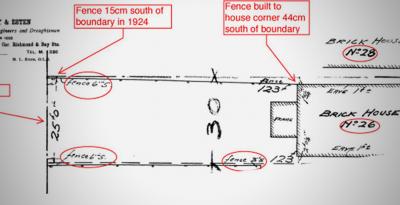Professional

A land surveyor's right to enter
Licensed Ontario Land Surveyors and their staff, working within the Province of Ontario, have a statutory right to enter onto private property in order to perform a survey....
Read More
Easements Can Impact The Real Estate Transaction
Your clients can be surprised to learn that they don’t always have the sole and exclusionary use of their own land....
Read More
Adverse Possession in Ontario – Viable strategy or a thing of the past?
Adverse possession is a proceeding by which a property owner loses his/her claim of ownership of a portion of their property to a neighbouring land owner who has established a possessory claim in a court of law....
Read More
Are Survey Plans Obsolete or The Most Important Document in the Transaction? Bob Aaron speaks.
On April 22 2015 the Law Society of Upper Canada is holding the 12th Annual Real Estate Law Summit in Toronto....
Read More
Surviving and Thriving in the New Boundary Reality
I was recently asked to write an article for the Association of Ontario Land Surveyors on the state of surveying and boundary due diligence in the real estate transaction....
Read More
Why a survey plan should be in your home selling package
Today’s savvy homesellers understand the value of showing their home in its best light....
Read More
Top 5 boundary Q&As
The first step to protecting your boundaries is to become informed about your rights as a private property owner....
Read More
Get property boundary answers at fall home show
Where are my property boundaries? Where does the fence go? What can I do about a property boundary dispute with my neighbour? If you have property boundary questions or concerns – or simply want to learn more about why a land survey plan is such an important homeowner document – be sure to check out the Protect Your Boundaries (PYB) booth (#909) at the Toronto Fall Home Show Sept....
Read More
49% of GTA properties have ‘boundary time bombs’
Approximately 49 per cent of residential properties in the Greater Toronto Area have property boundary discrepancies that could lead to disputes between neighbours, a study by PYB shows....
Read More
Title insurance and the new boundary reality
In the early 1990s, title insurance was introduced to the Canadian real estate market, offering lenders, lawyers and homebuyers insurance against title defects, off-title building code infractions, mortgage and title fraud, as well as many property boundary defects that would otherwise have been revealed in an up-to-date land survey plan....
Read More
How easements affect private property rights
You may be king of your castle, but do you have sole dominion over your land? The answer is ‘no’ if your property is subject to easement rights that allow another party to use part of your land or access services that cross it....
Read More
Honesty, good faith & the survey plan
A new development in Canadian common law will continue to play out in the business and legal worlds this year, with significant and far-reaching implications for all contractual agreements in Canada, including those that govern real estate transactions....
Read More- Page Previous
- Page 1
- Page 2
- Page 3
- Page 4
- You're currently reading page 5












